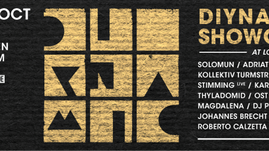DJ Euphonik Interviews SAMRO CEO On The Music License For DJs
- Customer Service
- Aug 22, 2014
- 5 min read
Following the recent arrests of a DJ for not having a music license, we look into the do's and don't's for DJ's. As a DJ in South Africa, you are required by law to obtain a music license to be able to play at any venue in the country. This once a year fee of R 930 covers you for any song, played any amount of times at any venue in the entire country. SAMRO is a member of the international organization CISAC, the global governing organization of collective management organizations.SAMRO being the local organization that works on behalf of musicians around the world.
DJ Euphonik on his My House Show on 5FM recently caught up with the CEO of SAMRO, Sipho Dlamini to clarify the recent arrest of a DJ for playing without a license, what you the DJ need to do to get yourself licensed and what the legalities are:
SAMRO: The reason a DJ need a license is because they are playing music that is owned by either record labels or people who have paid to record that music and they play it in a commercial space. So, what we at SAMRO do is we issue a license that is valid for the whole year, and you pay one fee which is R930 and you don't need to pay again for another 12 months and it allows you to play in any venue anywhere, without having to pay each and every time you play, so that is how the license works.
Euponik: Oh I see because a lot of DJ's, including myself were under the impression that for instance, if I was playing at venue x, venue x should have a venue license and if I am coming there to play music then i just fit in under that music venues license.
SAMRO: Sure, then you see, venue licenses are then calculated differently, so, you might have a venue that's a restaurant, and they would be licensed to have music but that license includes a live band playing or includes a solo singer which might come in and play a guitar and sing. A DJ still needs their own license which covers you to play at any venue in any type of scenario. So, whether you go and play at an outdoor festival, or whether you are playing in a hotel, or conference centre being turned into a venue for a special event, then as a DJ you have one blanket license that covers you to play anywhere, anytime. So yes, a venue gets their own license but it's based on a different format than what a DJ gets a license for.
Euphonik: Okay, so I am playing at venue x this past weekend, do I get to write down what songs I am playing and then submit them to SAMRO or does that blanket license cover that?
SAMRO: That license covers you for whatever you play. In an ideal world, people will tell us that they played this song but it is impossible, well, not impossible but it is very onerous to ask a DJ after playing a 3 hour set to write down every song he/she has played and submit a play list. The license covers you to play anything you want to play. We then have a lot of work because what we do is we take a bunch of different information from different places, we take information from radio stations, we take play lists that we do get from venue owners and we use that to calculate how to pay the composers on the other side, so all this money that comes in is put into one pool under the general licensing and it is then distributed and paid out to composers whose music has been assumed to have been used in different venues from the different reports that we get back.
Euphonik: How do you then know I just didn't play Euphonik's songs for the whole set? I think a lot of people don't read. When you buy a CD; on the back of the CD it says "Unauthorized copying, reproduction, hiring, lending, public performance and broadcasting are prohibited."
SAMRO: Exactly that is why the license is required, but again, and thank you for doing this interview because it is really helpful in getting people to understand. I think, when people understand why they need to pay for things, and when they understand that the money gets back to the composer in the beginning then people don't have a problem paying. It's when you tell someone, pay for something but you don't explain to them why they have to pay, Some people have not been told, So, from DJ's who have never been told that they need to get a license , I do think that it is unfair to arrest people without giving them the opportunity for them to participate in the cycle.
Euphonik: So, what are you saying? Are you saying that we can be arrested for it?
SAMRO: You know, I am surprised that somebody was arrested because my understanding is that there is a process that police have to go through before they can arrest you. There is a warrant of arrest that has to be issued by a judge etc, but I am not a police officer and I am not a lawyer, so I am surprised that a DJ was actually arrested and handcuffed for not paying this license.
Euphonik: Yes, if you are driving and you don't have your drivers license and you are stopped by the police, then they cannot arrest you. So, I do not understand how they would want to have to arrest someone for not having a music license. In the same light, I also think that like all other professions, if you want to take yourself seriously whether you are a DJ or a plumber, you find out, "Okay, if I am going to be a DJ, what does it entail to be a DJ? If getting a license is something you have to do in order for you to be considered as a serious DJ, then that is what you must do. So, I think, to say I was ignorant and I didn't know, does not cut it.
SAMRO: No it doesn't and that is why I will say that it is a criminal offense. As you say, what the CD says on the back of the CD is 100% correct. Public performance, hiring, copying, all those activities are illegal, so, unless you have a license, unless you get the permission from SAMRO or SAMPRA to have those licenses, what you are doing is illegal. You are right, if you are taking this as your profession, get the licenses you need. It is not hard. The other thing is that you will be surprised at how many DJ's do know and do have licenses. We have a number of DJ's that have already obtained their licenses.
Euphonik: Just to recap again, quickly, how do I get a license? Do I come to the SAMRO offices, or can I go online?
SAMRO: Yes, you can go online; you can go to www.samro.org.za, there is a section for music users. You can apply for a license on line, or you can drop us an email and somebody will call you and help you get the license
Euphonik: You said it was R 930 for the whole year and it allows you to play whatever you want, however many times at whatever venue, so once you have that license you don't have to worry about what do I play and what am I not allowed to play, it covers you for everything.
Source: 5FM, Pulse Radio

























































Commentaires